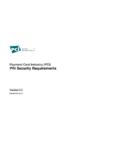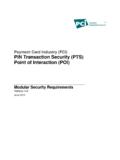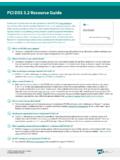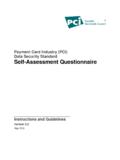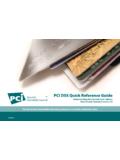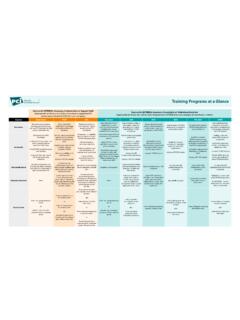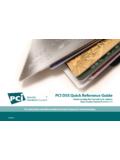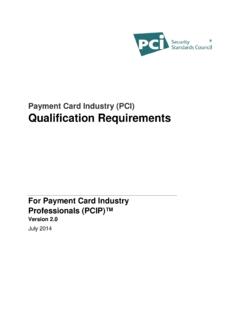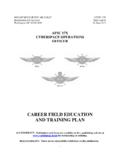Transcription of Payment Card Industry (PCI) Qualification …
1 Payment card Industry (PCI) Qualification requirements For Payment card Industry Professionals (PCIP) Version July 2014 PCIP Qualification requirements , July 2014 2012-2014 PCI Security Standards Council, LLC Page i Document Changes Date Version Description September 2012 Initial version of PCIP Qualification requirements November 2012 Minor modifications to update training and exam time allowances November 2013 Minor edits to align with PCI DSS and PA-DSS July 2014 Change Qualification expiration from two years to three; add clarity to the application process; add new continuing education requirement PCIP Qualification requirements , July 2014 2012-2014 PCI Security Standards Council, LLC Page ii Table of Contents Document Changes .. i 1 Introduction .. 1 Overview of the PCIP Credential .. 1 Benefits of Becoming a PCIP .. 2 2 Qualification Process.
2 3 Become Familiar with the PCI Standards and Supporting Documents .. 3 Complete and Submit an Application .. 3 Agree to Support the PCI Code of Professional Responsibility .. 4 Complete the PCIP Training Course .. 4 Take and Pass the PCIP Exam .. 4 Achieve Qualification .. 4 Maintain Qualification .. 5 3 PCIP Course Description .. 6 4 Credential Policies .. 7 Use of the Credential .. 7 Grace Period for Lapsed Qualifications and Credentials .. 7 Exam Security .. 7 Practitioner Feedback .. 8 Suspension and Revocation .. 8 Appeals Policy .. 8 Privacy Policy .. 9 Appendix A: PCIP Application .. 10 Appendix B: Code of Professional Responsibility .. 15 PCIP Qualification requirements , July 2014 2012-2014 PCI Security Standards Council, LLC Page 1 1 Introduction The PCI SSC Payment card Industry Professional (PCIP) Program provides a foundational credential for Industry practitioners who demonstrate their professional knowledge and understanding of PCI SSC standards ( PCI Standards ) and supporting materials.
3 The PCI Security Standards Council, LLC ( PCI SSC ) sponsors this Qualification and serves as an impartial, third-party evaluator of each candidate s knowledge and understanding of PCI Standards. PCI SSC is an open global forum for the ongoing development, enhancement, storage, dissemination and implementation of security standards for account data protection. The purpose of these Payment card Industry (PCI) Qualification requirements for Payment card Industry Professionals (PCIP) (the PCIP Qualification requirements ) is to provide the information required to apply for PCIP status by summarizing key aspects of the program and steps to earning and maintaining the PCIP credential. Questions about the program should be e-mailed to: Overview of the PCIP Credential Through the process of becoming a PCIP, the candidate will gain knowledge of the PCI Standards and how they relate to one another.
4 Subject to Qualification -renewal requirements , the PCIP credential remains with the individual, which means that as individuals switch employers they are able to maintain the PCIP credential throughout the entirety of their career growth and professional development. Candidates must possess a base level of knowledge and awareness of information technology, network security and architecture, and Payment Industry participants prior to beginning the process of becoming a PCIP and are strongly encouraged to complete the PCIP training course offered by PCI SSC before taking the PCIP examination. Note: Individuals who are qualified and in good standing as QSA employees or ISAs (as defined in the applicable QSA and ISA program materials) throughout the PCIP application process (collectively, Eligible QSA and ISA Individuals ) may apply for the PCIP credential and Qualification without completing PCIP-specific exams or training or reporting the CPE hours required of non-assessor PCIPs, as addressed further below.
5 PCIP Qualification requirements , July 2014 2012-2014 PCI Security Standards Council, LLC Page 2 Benefits of Becoming a PCIP Becoming a PCIP demonstrates a level of understanding that can provide a strong foundation for a career in the payments security Industry . Individuals who may be interested in this program include, but are not limited to, entry-level and seasoned security professionals, managers, executives, application developers, sales engineers, product management and marketing professionals, independent consultants and Eligible QSA and ISA Individuals. PCIP status also indicates a solid foundation for future career progression to other PCI qualifications such as QSA or ISA. By becoming a PCIP, the applicant is joining other dedicated professionals in the pursuit of the protection of account data and the environments where such information is stored, processed or transmitted.
6 Advantages of Becoming a PCIP Provides a starting point for entry-level and seasoned security professionals, managers, executives, and independent consultants to launch a career in the payments Industry . Become part of a PCIP community, where knowledge and best practices are shared. Offers an Industry -recognized credential that remains with the PCIP throughout their career. Recognizes knowledge of PCI Standards and dedication to the protection of account data. Promotes support of ongoing compliance efforts with knowledge of how to apply the PCI Standards to the PCIP s organization or client. Enhances professional credibility and provides a competitive advantage. Gives public recognition of professional achievement. PCIP Qualification requirements , July 2014 2012-2014 PCI Security Standards Council, LLC Page 3 2 Qualification Process * Candidates may choose to take the PCIP exam without accessing the PCIP training course.
7 ** Eligible QSA and ISA Individuals are not required to take the PCIP exam. Become Familiar with the PCI Standards and Supporting Documents Candidates for PCIP Qualification must familiarize themselves with background information regarding the PCI Standards and supporting documents by reviewing the material found on the PCI SSC website at (the PCI SSC Website ). Candidates are expected to have a good level of awareness of the PCI Standards and more in-depth knowledge of PCI DSS. They should therefore pay particular attention to the PCI Data Security Standard requirements and Security Assessment Procedures before taking the PCIP training and exam. Complete and Submit an Application In order to become a PCIP, candidates must first complete and submit an online application and pay applicable PCIP program fees. Fees may be paid by check or other means approved by PCI SSC.
8 Fees to participate in this program ( PCIP Program Fees ) are specified in the current PCIP Program Fees Schedule located on the PCI SSC Website. Candidates must possess a base level of knowledge and awareness of information technology, network security, network architecture, and Payment Industry participants. As part of the application process candidates must submit their resume or CV evidencing at least 2 years of work experience in an IT or IT-related role. Note: Eligible QSA and ISA Individuals are deemed to have fulfilled this requirement. PCIP Qualification requirements , July 2014 2012-2014 PCI Security Standards Council, LLC Page 4 PCI SSC reserves the right to reject any applicant if PCI SSC determines in its reasonable discretion, or has reason to believe, that the applicant fails to satisfy applicable PCIP program requirements or has, within two years prior to the application date, engaged in any conduct that would have entitled PCI SSC to revoke PCIP status.
9 Agree to Support the PCI Code of Professional Responsibility PCI SSC has adopted a Code of Professional Responsibility (the Code ) to help ensure the highest standards of ethical and professional conduct are followed. PCIP candidates must agree to advocate, adhere to, and support the Code. The Code is attached as Appendix B to the PCIP Qualification requirements , and by submitting a PCIP Application to PCI SSC, the PCIP applicant agrees to advocate, adhere to and support the Code. Complete the PCIP Training Course After submitting the application, individuals who have chosen to complete the PCIP training course will be e-mailed instructions for accessing the course when PCI SSC receives the application fee. Please refer to the current schedule of PCIP program fees (the PCIP Program Fees Schedule ) on the PCI SSC Website for course pricing information. Payment of the course fee allows the candidate a 30-day window to complete the course.
10 Candidates can access the course anytime during this 30-day period. Take and Pass the PCIP Exam Candidates will be given information on scheduling a computer-based PCIP exam at an authorized Pearson VUE Test Center. The Pearson VUE testing network includes over 5,000 testing centers in over 165 countries. The exam must be completed in one sitting and must be taken within 30 days of the candidate being given the information on how to schedule the exam. Eligible QSA and ISA Individuals are deemed to have satisfied the exam requirement. Candidates taking the exam will receive a pass/fail notification at its conclusion. Candidates who do not pass the exam on the first attempt may retake the exam within 365 days by paying a retake fee. Individuals who are not successful at passing the exam on the second attempt, or do not retake the exam within 365 days, are required to pay the initial course fee before taking the exam again.
